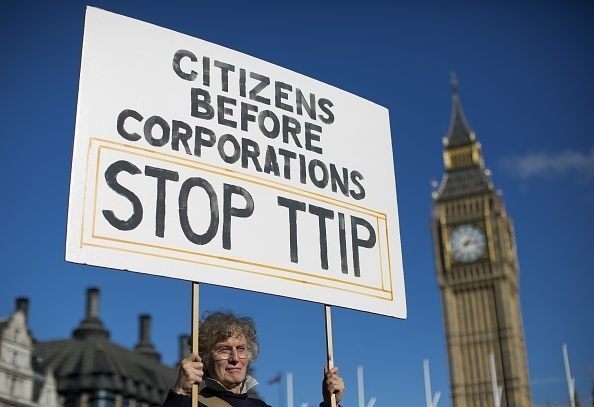Doubts are growing over whether the European Union and the United States can come to a conclusion on the controversial TransAtlantic Trade and Investment Partnership (TTIP) deal, as other items on the political agenda are being given precedence by the two trading blocks.
David O’Sullivan, a former trade negotiator who is now the EU’s ambassador to the United States, has said that forging the TTIP deal within the lifetime of the Obama administration is “still in the realm of possibility”, but that it would be an uphill struggle.
“I think it’s doable but I think it’s going to be a very heavy, heavy lift,” O’Sullivan said during an event for the alumni of Trinity College Dublin at the Irish Embassy in London on Monday.
Focus within the United States is currently on a trade deal with the Pacific nations, whilst Brussels is more occupied with the splits forming within the EU. Mr O’Sullivan said that the Presidential race, due to start in mid-2016 also posed a challenge to the deal.
Last week, German Chancellor Angela Merkel said she still hoped the EU would reach an outline framework for a deal with the United States by the end of the year, shortly after the U.S. Congress agreed to debate giving Obama more negotiating powers.
O’Sullivan said businesses needed to promote the economic benefits better, and urged negotiators to focus less on the nitty gritty, more on the geopolitical damage which would be wrought if the world’s two largest advanced trading blocs could not reach an agreement.
“TTIP is more than a traditional trade agreement. It also has geostrategic importance. How can we encourage China and others to value and promote an open, rules-based trading system if the EU and U.S. cannot resolve their differences?” he asked.
The British Prime Minister David Cameron has previously signaled his support for the deal after it came in for criticism by trade unions and campaigners amidst fears that it would undermine Britain’s National Health Service, amongst other things.
Speaking at the G20 summit last November, Mr Cameron dismissed those fears as “nonsense”, and said that arguments against the deal were “weak”.
The Conservatives’ International Trade Spokesman in Brussels, Emma McClarkin MEP told Breitbart London “TTIP will be a massive financial boost both for consumers and small businesses across Europe, and we are keen to have an agreement concluded as soon as possible.
“While the content of the agreement is more important than the speed at which the negotiations are concluded, it is correct to say that some heavy lifting will be required to move forward with negotiations if we are ever to reach the finishing line. We want a high quality comprehensive agreement that can set global standards in boosting trade whilst at the same time protecting consumers, sooner rather than later.”
But the subject has divided the right, with the UK Independence Party (UKIP) remaining opposed to the deal. UKIP Trade spokesman William Dartmouth MEP said: “UKIP is in principle in favour of free trade, but sadly TTIP is about putting unfair advantages for large corporations into legislation harming consumers, workers, patients and SMEs.
“One of the reasons UKIP is opposed to TTIP is that it threatens the NHS.
“Further, TTIP would be used to advance the EU’ Foreign Policy Goals. Worse still, TTIP would be used to create an EU influenced global regulatory regime. This has nothing to do with “regional politics.”
“Contrary to what Mr O’Sullivan thinks, it is clear, the more people learn about TTIP they more they oppose it. We will fight TTIP in the European Parliament to the maximum.”
Follow Donna Rachel Edmunds on Twitter: Follow @Donna_R_E or e-mail to: dedmunds@breitbart.com

COMMENTS
Please let us know if you're having issues with commenting.